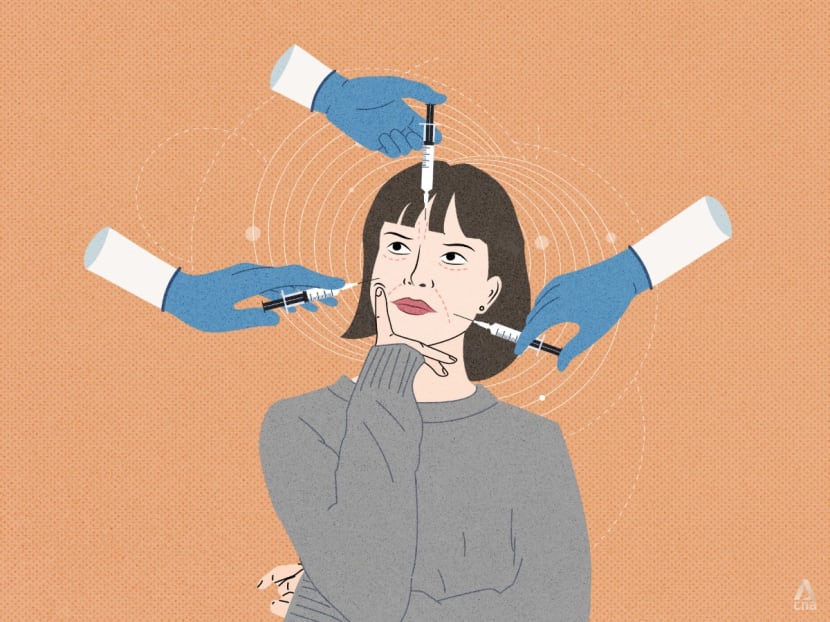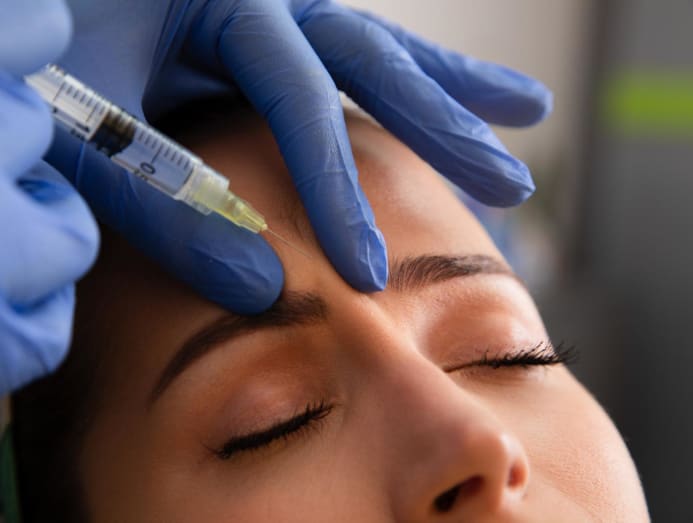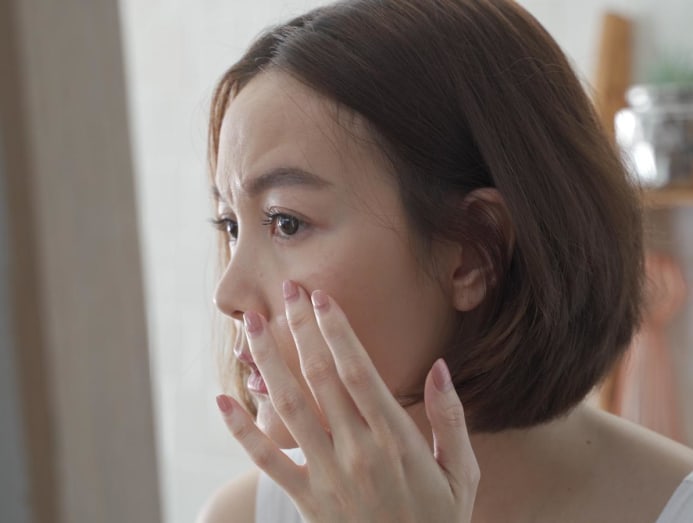Can botox really improve your self-esteem? Depends on how you already feel about yourself, say experts
Social media and the aesthetics industry boom have normalised cosmetic procedures, but when does our interest in changing our appearance become unhealthy?

Being obsessive about making changes to the way we look may point to underlying insecurities and psychological factors that would need time to resolve, ideally with a mental health professional. (Illustration: CNA/Samuel Woo)

This audio is generated by an AI tool.
These days, for every flaw we perceive about our bodies, there seems to be a treatment, procedure or regimen designed to "fix" each one.
Social media is rife with content promising aesthetic perfection. We fixate on beauty standards led by influencers, going down the rabbit hole of tutorials and tell-alls on how to achieve sculpted jawlines or glass-like skin.
Counsellor Bethany Chuah from psychological consultancy firm Mind What Matters said that studies have shown a clear link between social media materials such as these and an increase in cosmetic procedures.
Filtered images create the illusion that constant self-enhancement is normal or even necessary, and this can be psychologically risky.
The sea change is clear: Cosmetic procedures used to be something we kept hush-hush, but they are appearing more in public discourse and conversations.
Recently, American personality Kylie Jenner made a comment on a fan's TikTok video that quickly went viral, sharing the details of her breast augmentation surgery, down to the name of the surgeon and implant size.
Men are not exempt from similar pursuits. One of the newer trends to surface on online communities is "looksmaxxing", where young men seek to enhance their "sexual market value" through facial massages and cosmetic surgeries.
It has spawned a peculiar vocabulary used by those who subscribe to these ideas when discussing about their features.
For instance, "mewing" refers to a tongue exercise that purportedly sharpens jaw shapes, "IPDs" refers to interpupillary distance or the gap between the eyes, and "canthal tilt" is used to describe the angle of the eyes.
In Singapore, the Ministry of Health said that the number of licensed providers offering aesthetic services rose by an average of about 40 a year between 2020 and 2023. More young Singaporeans are opting for "injectables" such as botox and collagen shots.
Mental health experts told CNA TODAY that body dissatisfaction is normal to a certain extent. For instance, adolescents aim to look "cool" or be consistent with a certain image of themselves.
Mr Benjamin Low, senior clinical psychologist at specialist clinic Psych Connect, said that women, in particular, experience "normative discontent". This means they are often encouraged to be discontented with their looks and seek to appear better. However, "better" is defined according to prevailing ideals in society.
The insecurity we may feel about our faces or bodies is nothing new, but we now have the means to do something about it. We can smooth out every wrinkle, regrow every hairline.
With all these new avenues for "improvement", imperfection now seems intolerable. Fake is no longer taboo; unreal is the new norm.
Yet, given how easy it is to step into a clinic and book a consultation – or even an appointment for a procedure right away – how can we tell if we are doing it for the right reasons?
Are we acting out of an unhealthy insecurity about our faces or bodies? Can a desire to undertake such procedures ever come from a neutral, grounded place?
BODY POSITIVITY OR INSECURITY?
Firstly, it is important to note that there are differences in facial and body enhancements.
Invasive surgeries involve using an instrument to make skin incisions, often leaving scars. Some examples are nose reshaping, body contouring or facial surgery.
On the other hand, non-invasive procedures leave the skin intact and are usually performed via syringes or lasers. These cheaper, more convenient options usually don't require general anaesthesia and require less time for the patient to recover. Facial injections such as botox and dermal fillers fall under this category.
Both invasive and non-invasive procedures are getting increasingly popular. However, when is a person's desire for such an intervention borne out of a simple want for self-enhancement, and when does it reflect darker psychological causes?
Counsellor and psychotherapist Ana Jeremiah, who runs private practice The Journey Within, said that it is important to hold space for both sides of the spectrum.
"When it is about self-enhancement, the decision usually stems from a place of clarity and self-agency," she said.
In this case, these people likely already feel generally fine with themselves but want to align their outer appearance with how they feel inside. They are not driven by fear, pressure to conform or a need to be accepted and they can reflect honestly about their intent behind seeking a procedure.
Ms Jeremiah added: "They might be happy with who they are and where they are in life, and choose to undergo a procedure as a form of self-expression or even a personal reward, rather than out of shame or the hope that changing their appearance will solve deeper emotional pain."
One of her clients made the decision to undergo such a procedure from a self-aware position, and it ended up supporting her self-confidence. Ms Jeremiah attributes this to her client not making the mistake of letting her decision-making be driven by insecurity.

On the flip side, choices that stem from unhealthy reasons may not achieve the desired outcome.
"(Those) rooted in insecurity often carry urgency, shame or the belief that changing their appearance will finally make them feel 'enough', loved or accepted," Ms Jeremiah said.
Mr Low highlighted this factor for those who feel that most or all of their self-worth is based on their appearance. Such individuals may feel great discomfort in situations where their appearance may be noticed, for instance, in mirrors or among people.
"Grounds for suspecting an unhealthy cause are increased if the perceived flaw is not commonly seen as a flaw in the person's culture or if the flaw is barely noticeable objectively," he added.
OBSESSIVE CHECKING
Mr Low also stressed that if a person keeps looking at and negatively evaluating the state of the perceived flaw, their motivation for "fixing" it is likely to be psychologically unhealthy.
Such individuals may also often try to conceal the flaw, he said. For example, avoiding physical interaction with people, or wearing jackets to conceal perceived fat despite hot weather. This masking or avoidance behaviour can occur despite their desire to socialise with friends, for instance, or to dress lighter in humid climates.
Another red flag indicating unhealthy mindsets or attitudes is when people go for repeated procedures.
Mr Low pointed out that in such cases, the risk is that procedures borne out of unhealthy psychological causes will never be enough.
To self-identify a facial feature or body part as unsatisfactory or unseemly and then addressing it with external procedures might offer temporary relief, but "dissatisfaction with the same (feature or) part may resurface", he warned.
"They may also feel that the procedure did not fix it to their full satisfaction despite a technical success." Alternatively, these people might simply shift their fixation to a different feature or part.
"A physical fix does not fix a psychological cause," he added.
Another sign of trouble is if people seeking cosmetic enhancements believe that the procedures will magically fix unrelated areas of their life – suddenly finding love, for instance, or gaining social acceptance, Ms Chuah of Mind What Matters said.
Mr Jasper Loy, clinical director of Youthline, a youth service that provides free counselling, said that such individuals might not acknowledge the risks, pain, recovery time or potential for less-than-perfect results.
Strong resistance to any psychological evaluation or counselling before surgery is a potential indication that they are unwilling to address the underlying issues driving their desire for surgery and other procedures, he added.
"Cosmetic procedures can become a slippery slope. Each change briefly soothes insecurity, but doesn't address the root cause (of this need)," Ms Chuah emphasised.
"Long-term body confidence often requires deeper work."
If someone is considering a procedure, Ms Jeremiah offered some important questions that they should ask themselves:
- "Am I doing this to honour and express who I already am, or to finally feel 'enough' in the eyes of others?" This question helps clarify their motivation
- "If no one ever noticed or complimented the change, would I still want to do this?" This question gently invites one to reflect on whether the desire is truly for themselves or if it is rooted in external validation
CONFIDENCE COMES FROM WITHIN
Overall, Ms Chuah said genuine body confidence cannot come from a scalpel or syringe, but rather "from within". Building self-worth takes reflection, compassion and support from people who see your value beyond your appearance, she explained.
"It is not a quick fix, but the results are longer-lasting than any procedure."

Mr Loy from Youthline agreed that journeying towards self-acceptance requires patience. The ideal body is a myth, he said, and chasing it can lead to dissatisfaction and insecurity.
Instead, we are better off learning to love ourselves as we are, recognising our inherent worth and celebrating our unique qualities, he advised.
Worried that your friend, family member or loved one is considering an aesthetic procedure for the "wrong" reasons?
The key is to lead with empathy, not judgment, the counsellors said.
Instead of telling them what to do or what not to do, try to focus instead on helping them make an informed, self-aware decision, Ms Chuah proposed.
Mr Low said that concern can start with care but then escalate into worry, persuasion and coercion.
Avoid criticising them, he advised. Such criticisms may result in the distressed person feeling that they are a "problem" or are seen by others as one.
Instead, Ms Chuah suggested asking open-ended questions to understand their perspectives and help them feel safe to honestly explore their motivations.
Ms Jeremiah listed some prompts aimed at creating space for reflection without shame. For example, "What is leading you to consider this?” or "What do you hope it might change for you emotionally?"
"Remind them that you care about them as a whole person," she added.
"If they seem overwhelmed or distressed, gently suggest that they consider speaking with a therapist to process things further."












